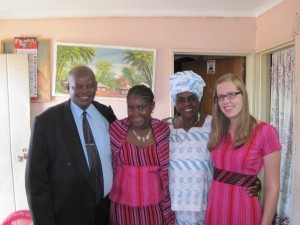This past week I have been living with a host family and traveling to the Center only to attend classes. I lucked out and had the most welcoming and energetic family that kept me both perpetually entertained and perpetually learning throughout the entire experience. Their house was located in Katatura, which is a township about a 10 minute drive from downtown Windhoek. Before independence, Katatura was segregated based on tribes- a strategy the colonial government used to keep the black population divided and less likely to come together and revolt. My home was located in the old “Oshiwambo location,” and while my family did speak primarily a dialect of Oshiwambo at home, Katatura is no longer segregated any longer. It does still remain a relatively low-income area- there were seven people living in an originally two bedroom house- which was made larger by several sturdily built metal rooms in the backyard. The toilet room, a stucco room in the backyard, also functioned as the shower room, and water from the sink drained into buckets outside that had to be routinely emptied. Despite a slightly cramped environment, the family all got along well, with everyone pitching out to wash dishes or clothes, and everyone gathering in the living room to eat meals together or watch movies. I can’t possibly describe everything, but here are some of my most interesting adventures:
– Learning how to eat oshifema: This is a warm bread dish about the consistency of silly putty or oatmeal that has hardened slightly. Its made from a seedlike grain called mahango that is then ground into flour, mixed with water, and cooked over the stove. I learned to take a wad of oshifema and then dip it into the meat sauce, and then follow it up by eating the meat with my hands. No silverware allowed!
– Watching “soapies”: Every night the whole family (and probably the entire neighborhood) was glued to the TV to watch the show “Sabor a Ti,” a Venezuelan drama poorly translated into English. Globalization at its finest.
– Practicing my Oshiwambo: My host dad found out I was taking this language in school and helped me (well, drilled me) in this new language I’m trying to learn. An example: Wa la la po? is Good Morning, and the response is “Ee-ee,” pronounced ayyyyyyyy?. I’m just glad I don’t need to learn any of the click languages, ‘Wambo is going to be hard enough!
-Going to Church: Oscar, my host dad, is very involved in the local Lutheran Church, and was the cantor for the Sunday service. The singing from the congregation of over 200 people gave me chills. The whole congregation sang in beautiful harmony and created such a full and powerful sound you could practically feel it vibrating through the air. Halfway through the service, Oscar invited me up and gave me the microphone to introduce myself, and invited me to sing a song with him that we had practiced the night before. So, I sang a hymn about welcoming and acceptance in Oshiwambo to the entire congregation! Despite the fact that I never sing in public, it went ok, and people were impressed- they thought I could actually speak the language, when all I was doing was phonetically reading the words in the hymnal. It felt good to offer something to the community and to show that I genuinely have an interest in learning about their culture. And it was nice to be stared at because I was actually doing something (singing) instead of being stared at just because of the color of my skin!
– Going to an Engagement Party: This was an interesting experience because the bride was Oshiwambo and the groom was from Germany. It was cool to see both sides of the family interacting and concrete proof that social norms have changed since apartheid. The tradition is that the women’s family nails a white flag to their home to show that their daughter is betrothed. And then, like in all cultures, you eat a ton of food to celebrate!
That’s all for now! If you have any questions, feel free to send me a comment!

